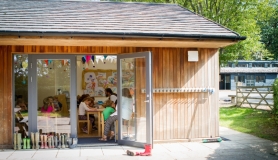I’ve just emerged from a very trying couple of years, containing all the ingredients of stress: Deaths, divorce, financial woes, moving house, illnesses and other events made me feel under fire at all times. It might have been a more sad and traumatic time, but for the support of good, solid friends. Thanks to them, I have emerged feeling not beaten down, but smarter, stronger, inspired and positive.
For many people, making friends is easy. Babies are intuitively social. Ancient peoples who forged strong connections, made allies and worked as a team during times of famine would have had better rates of survival, and teaming up with others protected against predators, so we are genetically predisposed to make strong bonds with others.
We are, in a sense, our children’s first friends. The way we relate to our babies teaches them how to relate to others. The words we say become their inner voice, and their bond with us sets the stage for bonding with others. A gentle, respectful relationship within the family sets the stage for good relationships outside.
SENSITIVITY AND COMPASSION
Long term studies have confirmed that children who are securely attached develop more satisfying bonds with others. Responding to a child’s needs with sensitivity and compassion tends to lead to a confident child who expects social connection and can empathise with the needs of their friends. So when we respond to babies’ needs, we are not only fulfilling their need for warmth and food. We are setting them up to become confident and communicative people. And this secure early attachment continues to make a difference as children get older, with adolescent children reporting better quality friendships with their peers if they felt that they could count on their parents for help and acceptance. A University of Minnesota study even tracked individuals from infancy into adulthood and found that babies who were securely attached at 12 months went on to have more meaningful bonds in adulthood.
Barry Durdant Hollamby, father of two and communications coach agrees, ‘Create an environment at home that celebrates and nurtures friendships and relationships, and your children will not only be best equipped to create strong and meaningful relationships - but they’ll want to! In a nutshell - if you want your child to learn to make strong relationships, then make sure you are prioritising and effecting healthy relationships at home.’
SHARING FUN
Playing with friends is important for forging strong bonds, and babies want to play at an early age. Games like ‘Peekaboo’ are universally fun for everyone: In the early months, when baby has not yet learned object permanence, it is fun for older kids and adults alike to hide for a moment – Where’s the baby? – And the joy in baby’s face when their missing person returns is just wonderful. Soon, baby learns that their person has not gone completely, they are just hiding. A new concept! And baby can hide too, under a blanket or behind their hands, squealing with laughter. Shared fun is one of the best indicators of friendship, and all of this early practice helps children feel liked and welcome in relationships, ready to share fun times with others.
In their first few years, children play with adults and older children. When other toddlers are near, they tend to play in parallel: alongside one another, observing. They have not yet developed the communication skills needed to play a game together. Gradually, they begin to involve one another in role playing games and occasionally bop one another on the head with a toy. Being able to acknowledge negative emotions can be helpful at this age, and children who are allowed to experience negative feelings with a safe adult tend to have better self-control and to be more understanding when their friends are upset. As they grow up, exploring social bonds and relationships gives them more opportunities to connect and deepen relationships. And usually, all of this occurs with little or no control from parents.
Mother of two, Kelly Warren Fitzjames explains how this occurs with her son and daughter. ‘My recent noticing is the less we interfere, the more they forge their own ways, individually and with friends… I can hear them relating in a wonderful way when there are no adults around. This is what feels authentic to me.’
MODERN CULTURE
But what about the kids who find it difficult to make friends? It is important to remember that there are as many types of friendships as there are people. Some children enjoy busy social lives with many friends, flitting from friendship to friendship like a butterfly. Still others have all-encompassing friendships where their worlds revolve around one or two best friends. Other children are shy, and some have difficulty reading faces, social situations and emotions. Some are perfectly happy in their own company and may prefer not to have to relate to other people. Parents can sometimes become anxious that their kids are not “popular”. With all the wonders of social media and ‘Instant Connectivity’ in our modern culture, we might feel that not connecting with many friends is a disadvantage. Modern people find their school, work and family lives more satisfying and productive if they can relate to the people they spend their days with. So an ability to make friends is something all parents want for their children, but it may not be as important as we feel. For outgoing adults, having a shy child can even be a source of confusion or embarrassment. We need to remember that it’s not about us.
When our children are young, it can be convenient to choose their friends for them. We tend to gravitate towards people like ourselves, and that includes setting up play dates with the children of our friends with a similar parenting style. Some of these early friendships can last for ever, but as our children get older it is important to give them some control over who they want to be friends with. If we welcome our children’s friends into our home, we honour our child’s individuality and show them that we trust them to make smart decisions.
ALLOW DOWN TIME
Many children balk at the thought of competing with potential friends, or need to connect on a more relaxed level, so remember the importance of “down time”. There is no need to fill play dates and parties with activities and games. Kids come up with creative ideas for play when they are left to their own devices. Meditating, doodling or cloud-watching together can be grounding activities for kids instead of competitive games.
Marneta Viegas, relaxation coach for children, shares the importance of a space for down time. ‘I remember as a child we had a chill out corner in a spare room. I loved having friends over and taking snacks and drinks up there. It is necessary for children to have somewhere special that is warm and safe to escape to.’
WITH PATIENCE
For some children, making friends is fraught with difficulty – they want to connect, but feel anxious or awkward. They may suffer from low self-esteem, and appear to push people away because they are afraid of being rejected. These kids can be helped to connect, with patience. A meaningful connection with caregivers is key; with a focus on nurturing
the child’s self-confidence. Once the child feels worthy and loveable, they can turn their focus outwards to confidently approach potential friends.
Meanwhile, remember that practice makes perfect. For shy kids, it is important to break things down in simple terms - it can be helpful to start a conversation about the simple mechanics of friendship. I used to role-play with one of my sons, teaching him to look people in the eye and smile; to listen to questions and respond. His friends and family appreciate it when he connects, and when he doesn’t want to connect, we all try to give him space. Keep empathising with your child, give them regular opportunities to connect with new people, and try not give them labels to live up to. Saying, “Oh, don’t mind little Tommy, he is just shy”, not only trivializes his emotions but makes it harder for him to prove you wrong and approach a potential friend. And insisting that a child socialise when they are clearly uncomfortable can make the thought of making friends even scarier for them.
We are all different and have our own paths. With time and patience and lots of love, even the shyest child can build confidence and form strong friendship bonds. It’s up to them when and how this happens.
Nan is mum of three teenage boys and she writes at thingsivefoundinpockets.com.
TEACHING CHILDREN ABOUT FRIENDSHIP
- Teach kids the importance of good manners: Looking people in the eye, saying hello and asking them about themselves.
- Be a good friend: Model good friendship in your relationships with others.
- Read stories about friends: Reading stories about friends having adventures together can give a shy child a framework for communication and relationship.
- Be a conversationalist: Family conversation around the dinner table is good practice for taking turns and asking and answering questions.
- Practice: Give children regular opportunities to meet and relate to people.
- Remember fun: Shared laughter is essential to friendship.
MORE INSPIRATION
LEARN Barry Durdant Hollamby offers coaching for relationships – both with your children or partner at the relationshipconsultancy.com
READ Pants of Peace by Marneta Viegas has meditations for children, available at relaxkids.com/UK/Books
LISTEN Find a free download to help parents do more relaxation with their children at relaxkids.com/free







